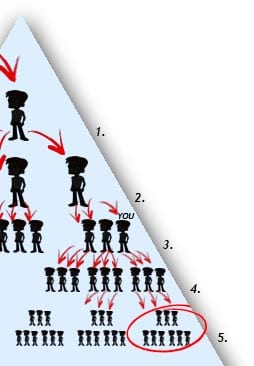The 10 online scams to watch out for before Christmas 2017
Pyramid scams

Over the festive period, you certainly don’t want to get involved in an illegal pyramid scam. These used to spread through email but have later evolved to social media, especially Facebook. If a post claims you can purchase 1 item and in exchange receive a lot more by referring other people, then that’s a pyramid scheme. Such schemes are unsustainable, and most people lose out. And they’re illegal. See here for more information.
To avoid these scams…
Basically, don’t sign up for a scheme which promises a much larger return just for referring people.
Sponsored Content. Continued below...
Fake E-Card emails
Always popular this time of the year are emails that purport to contain an E-Card from someone you know (or someone anonymous.) Recipients are instructed to either…
– Open a link, and then download a file to view the E-Card.
– Open an email attachment to view the E-Card.
Either method is enough to install malware onto the recipient’s device.
To avoid these scams…
Simply don’t trust these emails unless you were specifically expecting one from someone you know. Never open up an attachment to an email, and be especially wary of links in emails.
Fake “suspicious activity on your account” emails

At this (often) expensive time of the year, we may very well be using our PayPal accounts, eBay accounts or our online banking accounts more than usual. Scammers know this, and so we often see a rise in fake emails pretending to be from one of these entities claiming that “suspicious activity” has been detected and to click a link to confirm your details.
This is a classic phishing scam, and the link will lead to a spoof webpage that asks for the recipients login details, which are stolen when entered.
To avoid these scams…
Don’t click on links on emails. Instead head directly to the relevant website if you’re unsure.
Sponsored Content. Continued below...
Bait and Switch

Often we see advertisements offering impossibly good deals, like the latest iPhone for only a single dollar. It turns out that these deals are indeed impossible. They’re bait and switch scams. The great deal is just the bait, and clicking the link leads you to the switch, which is usually some sort of spammy “sweepstake” program that wants your contact details so marketing companies can spam you incessantly.
To avoid these scams…
If it looks too good to be true, it probably is. Spammy adverts that appear to switch the prize most probably just want your contact information to spam you.
Fake charity scams
Scammers are notorious for setting up fake websites, email addresses and funding pages for fake charities at this time of the year, as this is when most people will donate to charity. Scammers may set up fake adverts, send spam email or use social media to advertise their fake details.
To avoid these scams…
Always make sure that you’re on the official website or social media page of a charity before donating. Never donate if you’ve just clicked a link on an advert, email or social media, as this link you have led you to a spoof page.
Continued below...
Thanks for reading, we hope this article helped, but before you leave us for greener pastures, please help us out.
We're hoping to be totally ad-free by 2025 - after all, no one likes online adverts, and all they do is get in the way and slow everything down. But of course we still have fees and costs to pay, so please, please consider becoming a Facebook supporter! It costs only 0.99p (~$1.30) a month (you can stop at any time) and ensures we can still keep posting Cybersecurity themed content to help keep our communities safe and scam-free. You can subscribe here
Remember, we're active on social media - so follow us on Facebook, Bluesky, Instagram and X
